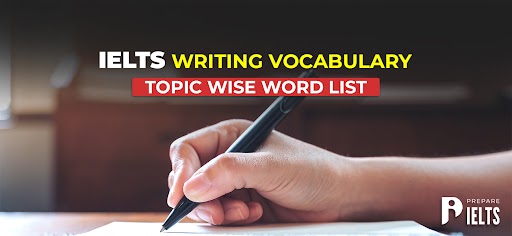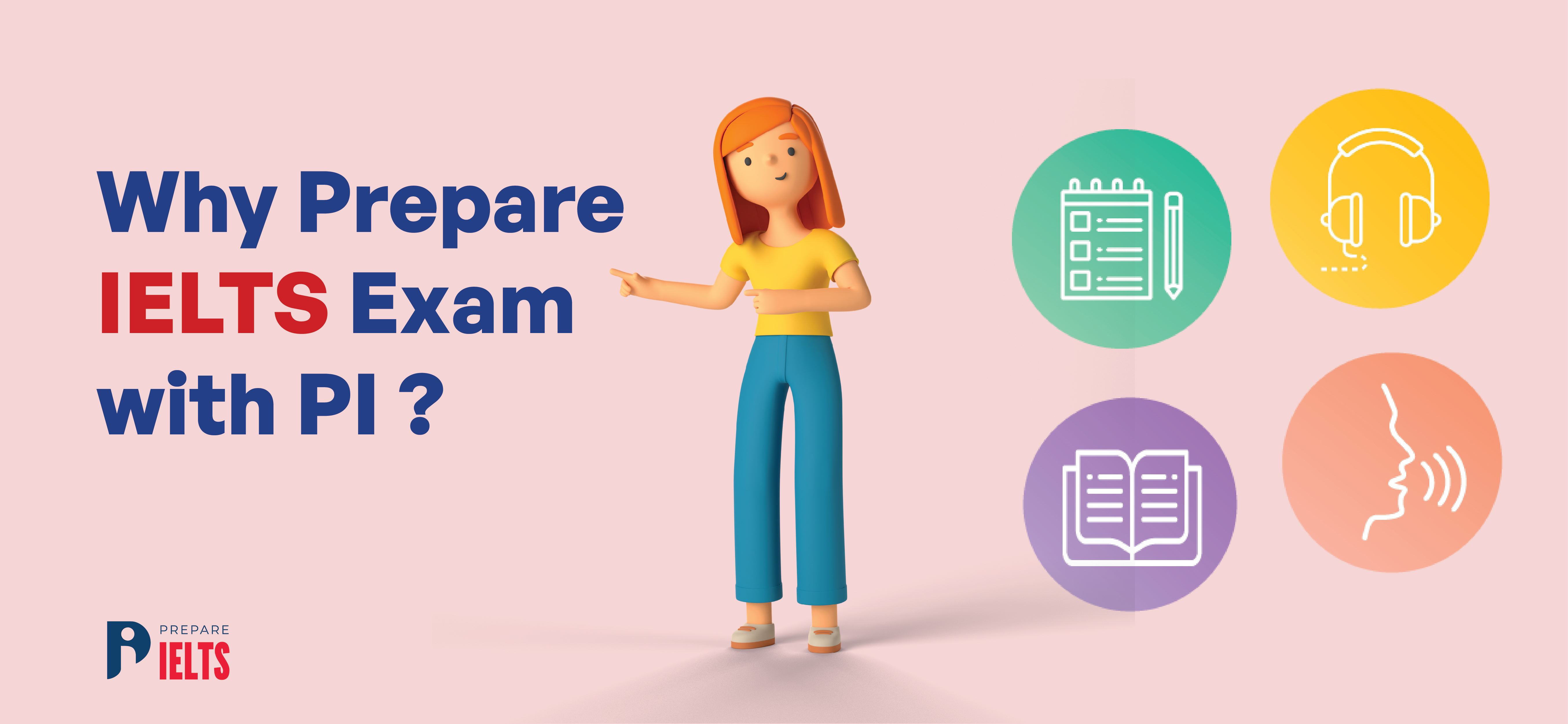IELTS Writing Vocabulary - Topic Wise Word List
PI - Prepare IELTS
25 May, 2023

IELTS Writing Vocabulary is your secret ingredient for acing your examination. You combine classic nouns, tangy adverbs and adjectives with the seasoning of phrasal verbs, making it the exotic IELTS Writing dish. To learn this vocabulary recipe, go through this comprehensive blog based on vocabulary for IELTS writing. We are sure this blog will help you sail through the IELTS Writing task by unlocking the power of your words.
The IELTS Exam is divided into two types, Academic IELTS and General IELTS. Both these exams have writing tasks entailing different formats. Let’s look through the elements of writing in both:
Writing Task 1
In this, visual representations are given to students in the form of graphs and diagrams where they have to report the information after understanding the given data. This part is marked on three criteria: introduction, overview, and supporting figures from the given diagram.
Writing Task 2
In this task, questions can be asked based on environment, culture, immigration and much more. In this segment, questions are based on a particular scenario where a student must present their point of view. They may be asked to discuss the given topic's benefits or drawbacks and present feasible solutions. IELTS academic writing task 2 is structured in an essay format.
Writing Task 1
In this task, students get a situation that they have to explain and enquire about further information through a letter.
Writing Task 2
In this task, students must present their answers in essay format using relevant arguments, factual evidence and proper justification.
Word formation
Use of less common vocabulary of expressions
Usage of synonyms
Ability to share opinions and expression
Now that we have gotten an insight into different formats of IELTS Writing Task, let’s go through the vocabulary for IELTS Writing Task 1 and vocabulary for IELTS Writing Task 2.
| Heading | Examples |
|---|---|
|
Expressing Personal Opinion |
In my opinion, As far as I’m concerned, In my experience, I must admit that, I believe/suppose that. |
|
Proving Arguments |
To attest, To prove, This (fact) is testified by, This (fact) is testified by, This (evidence) establishes that. |
|
General Point of View |
A common opinion is that, A popular belief is that, It is generally claimed that, It is generally considered that. |
|
Stating Facts |
The fact is that, It is obvious that, This proves that, There is no doubt that, It is clear that. |
|
Generalising |
Generally speaking, By and large, Typically, On the whole. |
|
Quoting Examples |
For example, For instance, Evidence for this, A good illustration of this. |
|
Conclusion |
To summarise, In conclusion, Overall, To conclude, Taking everything into consideration. |
| IELTS Writing Vocabulary for Graphs | Examples |
|---|---|
|
Introduction of Graph |
The pie chart_( Can be filled by the below-mentioned examples) Gives information about/on, shows, illustrates, compares, describes, provides information about/on, draws the conclusion of. |
|
Describing Changes In Graph(nouns)
|
A rise of, a peak of, a surge of, a dip in, a decline in, a fall in.
|
|
Adverbs for changes |
Sharply, suddenly, rapidly, abruptly, significantly, dramatically, steadily, considerably. |
|
Adjectives for changes |
Modest, gentle, gradual, steep, substantial, spectacular. |
|
Some Useful Phrases |
A small fraction, a small number, a significant majority, a large portion. |
| IELTS Writing Vocabulary for Letters | Examples |
|---|---|
|
Formal Letter Openings |
I am writing to enquire about, I am writing to request, I am writing to express interest in, I am writing to inform you, I am writing to complain about. |
|
Formal Letter Closing |
Contact me if you need any other information. I look forward to your reply. Once again, I apologise for any inconvenience. Thank you in advance! |
|
Informal Letter Opening |
Hi, my name is x, and I’ve been assigned to be your fitness coach. Hello there, I hope your holidays are going well. Hello, My name is Y, and I’m a volunteer conducting student excursions. |
|
Informal Letter Closing |
Anyway, I‛ve got to go now. Write again if you need further information. Well, let me finish here. I'm eager to hear your response to this letter. |
Mentioned below are some important tips for vocabulary for IELTS writing that will definitely assist you:
Paraphrasing
Learning the correct way to paraphrase is essential for the IELTS Writing Task. Students need to identify the appropriate words to repeat and paraphrase. Apart from this, using synonyms, passive voice, and rearranging the word form and sentence structure are key components to paraphrasing accurately.
Uncountable Nouns
Generally, students need to correct the most common mistakes in using uncountable nouns. For instance, information is an uncountable noun and can not have a plural “s” or an article, nor can a number quantify it. So it is advised to review some most common uncountable nouns to provide errors thoroughly.
Understand the Context
Having a knowledge of a particular world and gaining an understanding of the context for the same are two different things. For this, a student must first understand the meaning and usage of the word to fit the word in the right context. Also, overstuffing heavy vocabulary words to make a sentence rich sometimes alters the meaning. Hence, students should be alert about that.
Information from Different Sources
To enhance your IELTS writing vocabulary, you can start consuming information from various sources, such as reading newspapers, watching English movies, and reading books. Also, make sure to take note of new words and search for synonyms and acronyms related to that word to enrich your vocabulary further.
Practice Smartly
Work channelled in the right direction is the only way to success. Hence you should make it a practice to learn new words every day. Avoid memorising the words, as it can create confusion when the context changes. Instead, use the concept of mnemonics, wherein you use visual or auditory cues to connect two words. This tactic helps in the long-lasting retention of the words.
Although various topics have been asked during your IELTS Writing Task, we have mentioned basic vocabulary for IELTS Writing based on common topics. Have a look at the table mentioned below:
| Topic | Examples |
|---|---|
|
Technology |
State-of-the-art technology, artificial intelligence, internet-enabled, wireless hotspots, computer literate. |
|
Global Warming |
Carbon emissions, carbon footprint, environmental crisis, climate solutions, greenhouse effect, rapid industrialisation. |
|
Food and Nutrition |
Refined carbohydrates, seasonal fruits, balanced diet, physical fitness. A scrumptious meal, home-cooked meals, fine dining, exotic meals. |
|
Travel |
Glistening beaches, lush-green forests, travel itinerary, backpacking, bucket list, breathtaking views, affordable destinations, luxurious stay, souvenir. |
|
Immigration |
Middle-income countries, increased movement, multicultural society, immigration policies, international community, global scenario. |
Now that we have covered specific vocabulary for IELTS writing, let’s go through the list of some general vocabulary for IELTS writing.
| IELTS Writing Vocabulary General topics | Examples |
|---|---|
|
Nouns |
Analysis, methodology, conclusion, evidence, argument, theory. |
|
Verbs |
Evaluate, describe, compare, demonstrate, propose, assess. |
|
Adjectives |
Open-minded, blunt, self-assured, reliable, robust, feasible, sufficient |
|
Adverbs |
Coherently, slightly, modestly, steadily, realistically, rigorously. |
|
Phrasal Verbs |
Leave out, put forward, look into, go over, hand out, set forth. |
|
Idioms |
In the long run, it goes without saying, at the end of the day, In a nutshell, to a large extent. |
To ace the exam, proficient vocabulary for IELTS writing tasks is essential. Moreover, vocabulary forms 25% of your IELTS writing and speaking marks. It also plays a crucial role in IELTS Listening and IELTS reading tasks. Hence students need to start working on their IELTS writing vocabulary to perform well.
We hope we have provided you with helpful insight into IELTS Writing Vocabulary. If you need further guidance, please contact Prepare IELTS (PI) expert counsellors. Our team of education experts is dedicated to providing you with the best guidance in preparing for the IELTS Exam.
You can get on a one-to-one free counselling session online via our platform. Contact us at info@prepareieltsexam.com or call us at 9773398388.

8 Jun, 2023

7 Aug, 2023

6 Jul, 2023

5 Jun, 2023

31 May, 2023

31 May, 2023

31 May, 2023

31 May, 2023

31 May, 2023

31 Jul, 2023

11
13 Nov, 2024
dsasdSince Indian students are writing and speaking in English with Indian accent, with not much exposure to foreign accent, it can be the cause of
1
24 Aug, 2023
IELTS Exam Eligibility Criteria 2023Since Indian students are writing and speaking in English with Indian accent, with not much exposure to foreign accent, it can be the cause of
1
21 Aug, 2023
Mastering IELTS Speaking General: The Ultimate Guide to Improve Your Communication SkillsSince Indian students are writing and speaking in English with Indian accent, with not much exposure to foreign accent, it can be the cause of
1
17 Aug, 2023
Mastering the IELTS Exam: Your Ultimate Preparation GuideSince Indian students are writing and speaking in English with Indian accent, with not much exposure to foreign accent, it can be the cause of